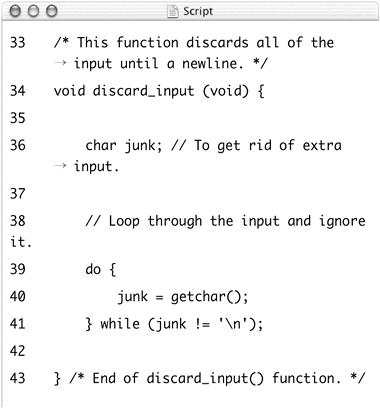Comparing Strings
Comparing numbers is a very easy task, involving the standard comparison operators (==, <, >, <=, >=), but you cannot compare strings using them. Instead, there is the strncmp() function:
strcmp (string1, string2);
This function returns the value 0 if the two strings are the same and returns a nonzero value otherwise. Normally you'll want to use this as a condition in an if-else statement:
if (strcmp(string1, string2) == 0) {
// The same!
} else {
// Different!
}
Our next example creates a tough but functioning guessing game, where the user must guess a three-letter word.
To compare two strings
1. | Create a new file or project in your text editor or IDE. |
2. | Type the standard beginning lines of code (Script 11.4): /* guess.c - Script 11.4 */ #include <stdio.h> Script 11.4. This guessing game reads in a word and compares it to the right answer. The process continues until the user guesses the correct word.
|
3. | Include the string.h header: #include <string.h> Since this application makes use of the strcasecmp() function, you must include the string.h file where it is defined. |
4. | Add a function prototype: void discard_input (void); Because this application relies so heavily on precise user input, it will utilize the discard_input() function, first defined in Chapter 7, “Creating Your Own Functions.” This prototype indicates that the function takes no arguments and returns no values. |
5. | Begin the main function: int main (void) {
|
6. | Define two character arrays: char guess[10]; const char answer[] = "coy"; The first array will store the user's guess. The second array is a constant that stores the right answer, which is initialized here as well. If you wanted, you could make the game less exact by limiting the size of guess[] to four characters. That way, only the first three characters entered (plus the �) would be assigned to guess. The end result would be that the user-submitted word doggerel would still match the answer dog. |
7. | Prompt for and read in the user's first guess: printf("Guess what three-letter word
All of this is familiar territory, where the user is prompted and that entered text is assigned to the guess variable. |
8. | Discard any extraneous input: discard_input(); Calling this function here will discard any other characters typed after the application has read in the nine (or up to nine) characters assigned to guess. By using this, we ensure that any extraneous characters will be discarded instead of being read in as part of the next guess. |
9. | Begin a while loop to compare the user's answer against the right word: while (strcasecmp(answer, guess)) {
The while loop evaluates a condition and, if true, executes the code therein. With this specific loop, the condition is a call to the strcasecmp() function, comparing the value of answer to the value of guess. If the two strings do not have the same value, the function will return a nonzero value, which is true in C. In such cases, the contents of the loop (Step 10), which says the guess was wrong and that the user should try again, are executed. If the submitted guess matches the right answer, the strcasecmp() function will return 0, which is false in C, and the loop will not be entered. |
10. | Complete the while loop, re-prompting the user, reading in the answer, and discarding any extraneous input: printf("Incorrect! Guess again:
The contents of the while loop will only be executed if the strcasecmp() function determines that guess and answer are different. If so, the user is re-prompted, the next guess is read in, and the remaining input is discarded. After these three lines of code have been executed, the loop's condition will be reevaluated—testing the new guess against the right answer. The process will continue until the user guesses the correct answer. |
11. | Tell the user they got it right: printf("You are correct!");
The application will only reach this point in the code—after the while loop—if the user enters the correct answer. |
12. | Complete the main function: getchar(); return 0; } |
13. | Define the discard_input() function: void discard_input (void) {
char junk;
do {
junk = getchar();
} while (junk!= '
'),
}
This function must be defined in order to use it. Revisit Chapter 7 for the description of this particular syntax. |
14. | |
15. | Play the game (Figures 11.10 and 11.11). Figure 11.10. The application continues to run until the user enters the right answer.
|
Figure 11.11. If the answer is guessed on the first try, the while loop is never entered (see Script 11.4).

✓ Tips
If you're curious, strcmp() returns a negative number if string1 comes before string2 alphabetically and returns a positive number if string2 comes before string1.
The strncmp() function compares two strings character by character until a difference is found or until n number of characters have been compared:
char s1[] = "catastrophic"; char s2[] = "catalog"; strcmp(s1, s2); // positive number strncmp(s1, s2, 4); // 0
If you're only comparing single characters, use the standard equality operator:
if ('A' == 'B') { ...



